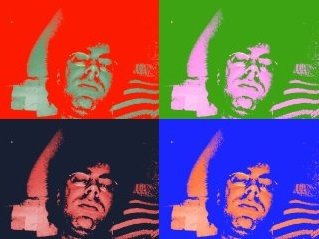To the New Age of the Unprinted Word, or, Kaavya Viswanathan: Scapegoat of Truthiness, Part II
I HAVE DELETED MOST OF THE CONTENT FROM THIS POST BECAUSE IT WAS A BAD POST. I HAVE LEFT A FEW WORDS BELOW BECAUSE THEY AREN'T AS BAD AS THE OTHERS.
My only guess as to what will (and already is) filling the print media void is the Internet, and I honestly don't know whether this is an ominous premonition of a new-dawning era of rampant hearsay and vacant chatter or whether I should feel hopeful that maybe the bloggers will pull a few of the punches the Corporate Media isn't up for. In either case, here's to the impending Age of the Unprinted Word.
My only guess as to what will (and already is) filling the print media void is the Internet, and I honestly don't know whether this is an ominous premonition of a new-dawning era of rampant hearsay and vacant chatter or whether I should feel hopeful that maybe the bloggers will pull a few of the punches the Corporate Media isn't up for. In either case, here's to the impending Age of the Unprinted Word.
Labels: book scandals, books


2 Comments:
These are both "book scandals," true, but I think the similarity ends there. With Frey, the popular media was up in arms. "Omigod, he lied!" But with Viswanathan, the accusation is plagiarism, which to most people probably isn't nearly the same as just making shit up. What really matters with the Viswanathan case -- and what renders it more along the lines of elite chitter-chatter posing as news in the NYT -- is the Harvard angle. If this girl went to, say, Ohio State, this story would have died quietly.
I like what you say about there being a "growing mistrust of facts" but there seem to be far better examples of this than these book scandals: intelligent design, for instance.
Nick: I agree that the Viswanathan scandal has not been the big deal that the Frey scandal was, nor is it probably the best entrypoint for a discussion of our "growing mistrust of facts." I chose it mostly because of the coincidence of a second book scandal appearing since my last post on the Frey scandal. That said, I do think the scandals in tandem present a unique angle on the mistrust of facts -- namely a mistrust of the facts that come from books and newspapers and other printed media. Television, the Internet, and word-of-mouth seem to have replaced the print medium as the primary means through which Americans recieve their "news." This is of no small concern for the Times (see this week's magazine feature on e-books: http://www.nytimes.com/2006/05/14/magazine/14publishing.html?_r=1&oref=slogin), which is one reason why I imagine they dwelled on both the Frey and the Viswanathan cases longer than necessary. The other reason for the interest in Viswanathan, as you mentioned, is the Harvard angle. I agree that if Viswanathan had gone to OSU, no one would have really cared. But there seems to be a collective desire (among Times readers, at least) to see this up-and-coming member of the socially elite removed from power . . . which I see as a stand-in for our deeper yearning to see our elected leaders punished. Of course, the media is in no position to take down the Bush administration, so for now we have to make do with a college student. To me, at least, this only winds up reenforcing my skepticism that the traditional print media has any effectiveness whatsoever -- although I suppose it may be unrealistic to hope for another Woodward and Bernstein right now, it seems like this administration has fucked up more than enough to warrent a media-induced resignation or two. It's a somewhat convoluted argument, I know, but this is the first time I've blogged in a while.
Post a Comment
<< Home